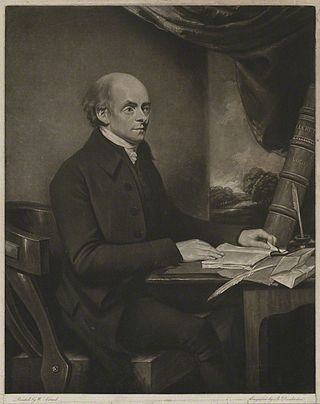
Thomas Robert Malthus was an English economist, cleric, and scholar influential in the fields of political economy and demography.

A grain is a unit of measurement of mass, and in the troy weight, avoirdupois, and apothecaries' systems, equal to exactly 64.79891 milligrams. It is nominally based upon the mass of a single ideal seed of a cereal. From the Bronze Age into the Renaissance, the average masses of wheat and barley grains were part of the legal definitions of units of mass. Expressions such as "thirty-two grains of wheat, taken from the middle of the ear" appear to have been ritualistic formulas. Another source states that it was defined such that 252.458 units would balance 1 cubic inch (16 cm3) of distilled water at an ambient air-water pressure and temperature of 30 inches of mercury (100 kPa) and 62 °F (17 °C) respectively. Another book states that Captain Henry Kater, of the British Standards Commission, arrived at this value experimentally.
Sir John Maunsell, Provost of Beverley Minster, was a king's clerk and a judge. He served as chancellor to King Henry III and was England's first secretary of state.

Gilbert Wakefield (1756–1801) was an English scholar and controversialist. He moved from being a cleric and academic, into tutoring at dissenting academies, and finally became a professional writer and publicist. In a celebrated state trial, he was imprisoned for a pamphlet critical of government policy of the French Revolutionary Wars; and died shortly after his release.

The Headmasters' and Headmistresses' Conference (HMC), formerly known as the Headmasters' Conference and now branded HMC (The Heads' Conference), is an association of the head teachers of 351 private fee-charging schools (both boarding schools and day schools), some traditionally described as public schools. 302 members are based in the United Kingdom, Crown dependencies and the Republic of Ireland. There are 49 international members (mostly from the Commonwealth) and also 28 associate or affiliate members who are head teachers of state schools or other influential individuals in the world of education, who endorse and support the work of HMC.

Malthusianism is a theory that population growth is potentially exponential, according to the Malthusian growth model, while the growth of the food supply or other resources is linear, which eventually reduces living standards to the point of triggering a population decline. This event, called a Malthusian catastrophe has been predicted to occur if population growth outpaces agricultural production, thereby causing famine or war. According to this theory, poverty and inequality will increase as the price of assets and scarce commodities goes up due to fierce competition for these dwindling resources. This increased level of poverty eventually causes depopulation by decreasing birth rates. If asset prices keep increasing, social unrest would occur, which would likely cause a major war, revolution, or a famine. Societal collapse is an extreme but possible outcome from this process. The theory posits that such a catastrophe would force the population to "correct" back to a lower, more easily sustainable level. Malthusianism has been linked to a variety of political and social movements, but almost always refers to advocates of population control.
Thomas Graham may refer to:
Physician to the King is a title held by physicians of the Medical Household of the Sovereign of the United Kingdom. Part of the Royal Household, the Medical Household includes physicians, who treat general conditions, and extra physicians, specialists who are brought in as required.

The book An Essay on the Principle of Population was first published anonymously in 1798, but the author was soon identified as Thomas Robert Malthus. The book warned of future difficulties, on an interpretation of the population increasing in geometric progression while food production increased in an arithmetic progression, which would leave a difference resulting in the want of food and famine, unless birth rates decreased.

The King's Gallantry Medal (KGM), formerly the Queen's Gallantry Medal (QGM), is a United Kingdom decoration awarded for exemplary acts of bravery where the services were not so outstanding as to merit the George Medal, but above the level required for the King's Commendation for Bravery.

Mary "Moll" Davis, also spelt Davies or Davys, was a courtesan and mistress of King Charles II of England. She was an actress and entertainer before and during her role as royal mistress.
Groom of the Chamber was a position in the Household of the monarch in early modern England. Other Ancien Régime royal establishments in Europe had comparable officers, often with similar titles. In France, the Duchy of Burgundy, and in England while French was still the language of the court, the title was varlet or valet de chambre. In German, Danish and Russian the term was "Kammerjunker" and in Swedish the similar "Kammarjunkare".
The Political Economy Club is the world's oldest economics association that was founded by James Mill. It was founded in 1821 in London with David Ricardo, Thomas Malthus, and Robert Torrens, because there were not any professional associations for free trade economists to peer-review their work. Despite Mill's exclusive limit to 30 members: the Political Economy Club was a predominant influence on 19th century economics.
Daniel Graham is an American football player.
Silvanus Bevan FRS was an apothecary, who founded the London firm of Allen & Hanburys.

Brian Duppa was an English bishop, chaplain to the royal family, Royalist and adviser to Charles I of England.

The King's Thief is a 1955 swashbuckling CinemaScope adventure film directed by Robert Z. Leonard, who replaced Hugo Fregonese during filming. Released on August 5, 1955, the film takes place in London at the time of Charles II and stars Ann Blyth, Edmund Purdom, David Niven, George Sanders and Roger Moore.

Daniel Graham was apothecary to King George II, King George III and Chelsea College Hospital. He was the son of Thomas Graham who was apothecary to King George I and George II, and was apothecary general to the British army.

Richard Robert Graham was apothecary to the Chelsea College Hospital. He was the son of Daniel Graham who was apothecary to King George I and George II, and was apothecary general to the British army.
The Faculty of Economics is one of the constituent departments of the University of Cambridge. It is composed of five research groups, in macroeconomics, microeconomic theory, economic history, econometrics, and empirical microeconomics. It is located in the Sidgwick Site in Cambridge, has been host to many distinguished economists, and is regarded as the birthplace of macroeconomics. 19 students or members of the faculty have won the Nobel Memorial Prize in Economic Sciences.











